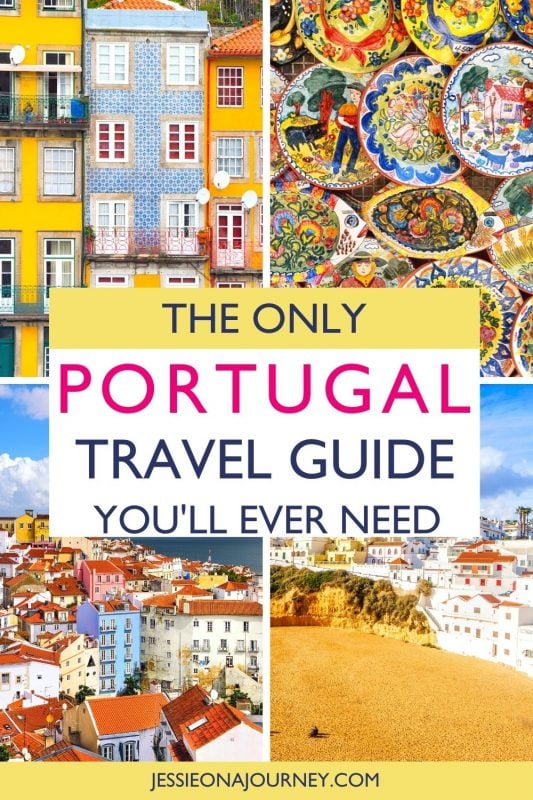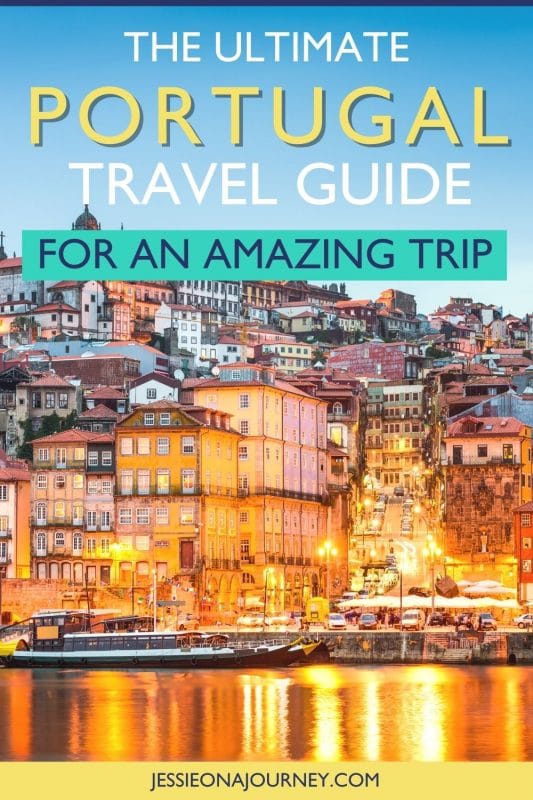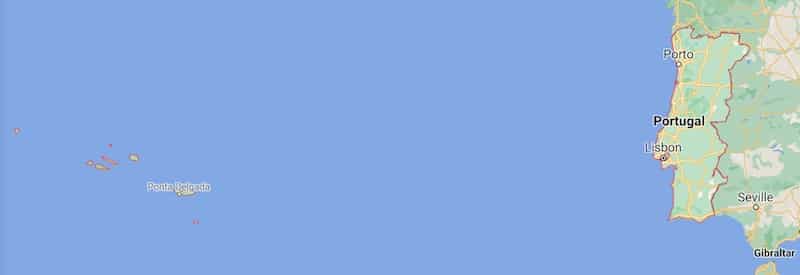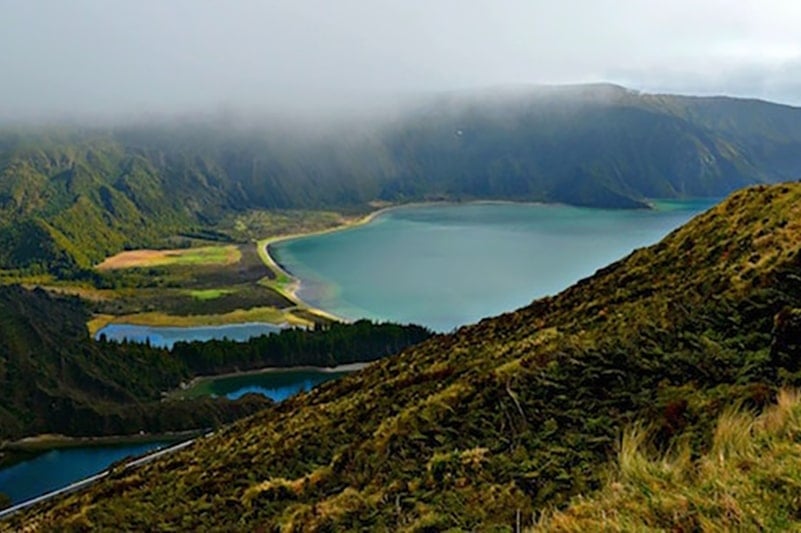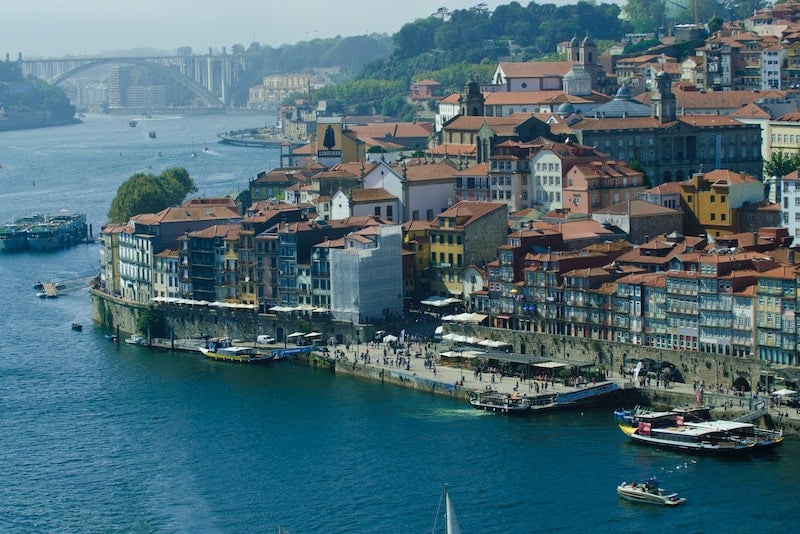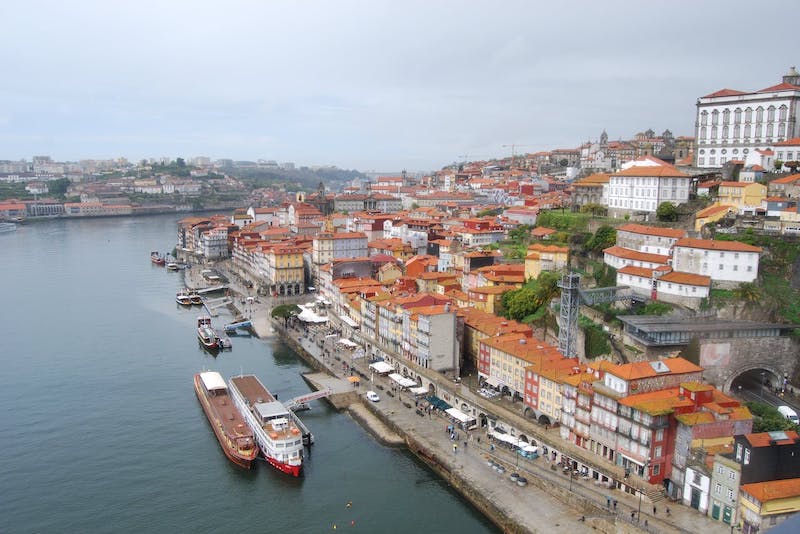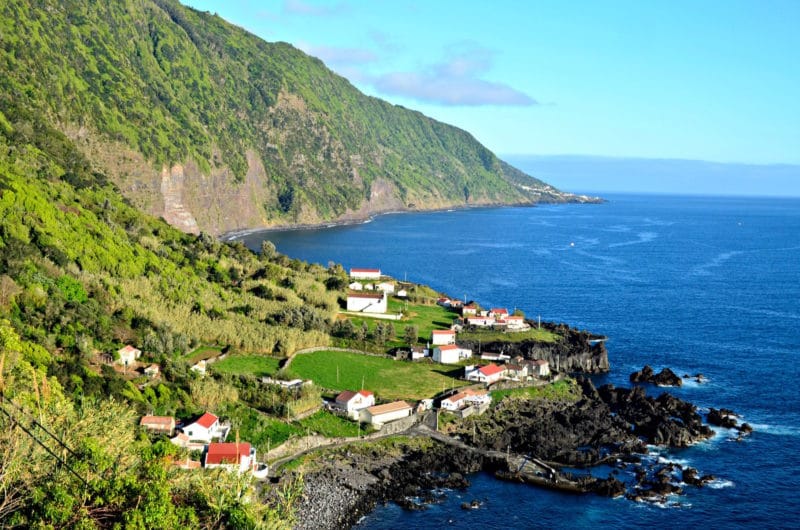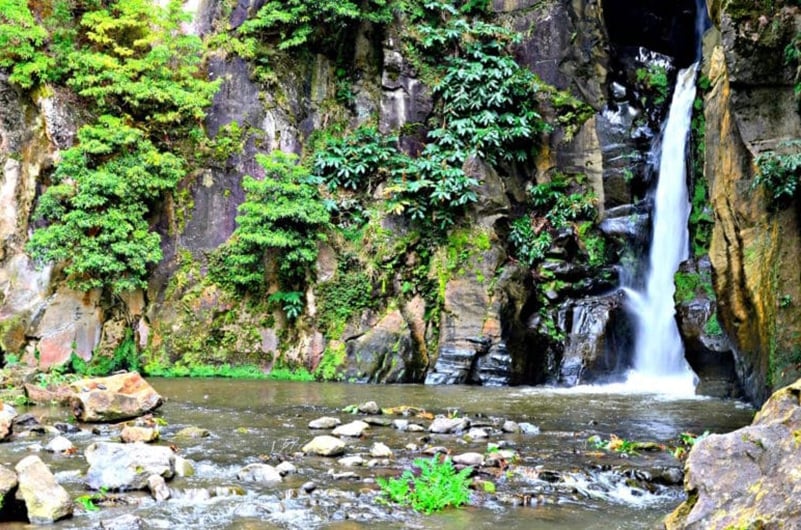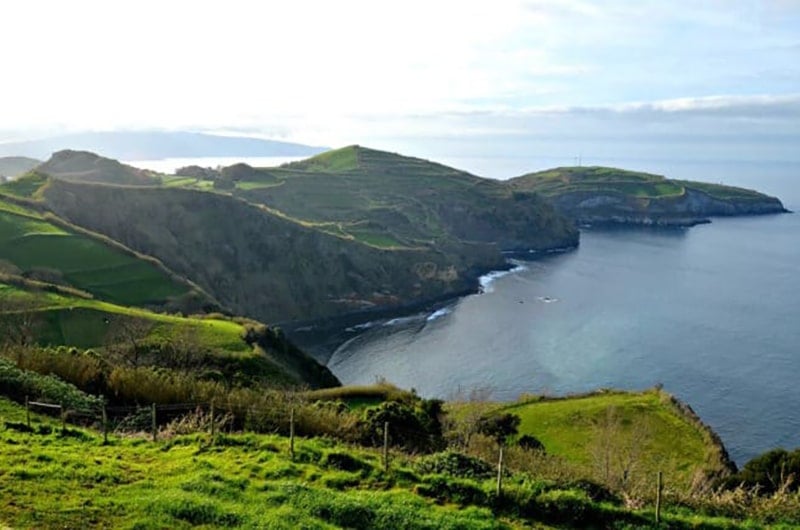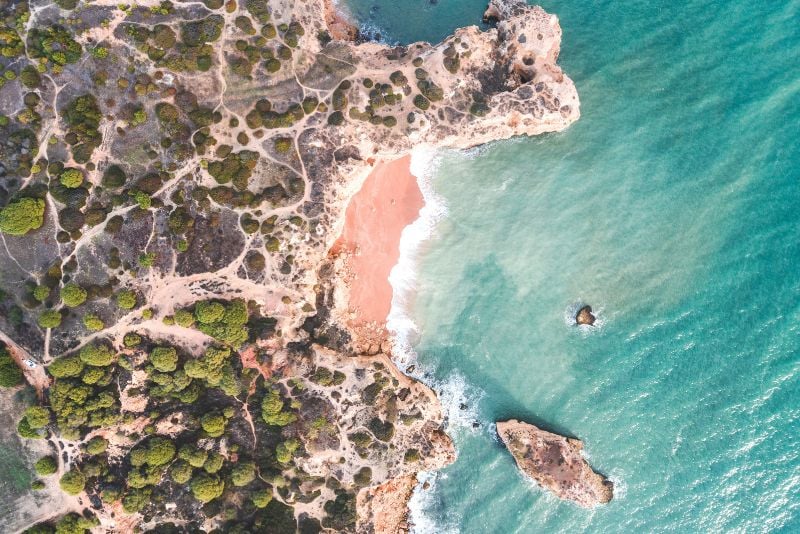Portugal Travel Guide
Looking for an in-depth Portugal travel guide?
Then you’re in the right place!
Portugal may be a small country, but it is definitely mighty when it comes to European travel destinations.
From mountains to beaches to medieval cities, Portugal has something for every kind of traveler.
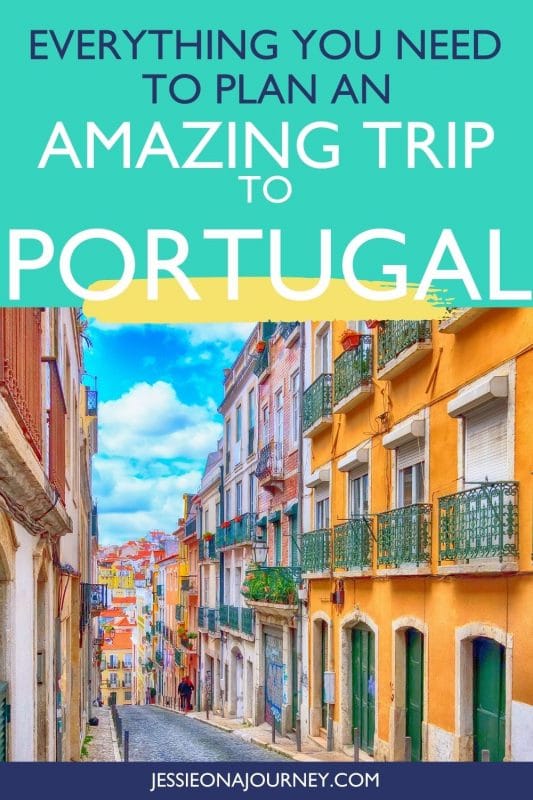
This sunny country has become a top destination in recent years for those looking for a beach vacation with a little something extra. If you want to soak up some sun, culture, and delicious food, Portugal is the place for you.
Northern Portugal is probably best known for its national park, gothic cathedrals, and vineyards. It’s the perfect destination for the more adventurous traveler. For instance, those wanting to explore some of the world’s best hiking can enjoy the beauty of Paneda-Geres National Park which is full of waterfalls, old Roman roads, and Celtic settlements.
If you’re looking for some truly unique sights, head to Braga, home to Baroque Santuário do Bom Jesus do Monte (the Sanctuary of Bom Jesus do Monte), a sanctuary atop a zig-zagging hillside staircase.
Love wine?
Then you’ll want to check out Porto, the town that gave the world its famous port wine.
Moreover, in Central Portugal, you can visit quaint villages tucked into the mountains, explore archipelagos, and catch some of the best waves in the country. With several medieval cities, you can take a trip back in time in this area while enjoying all the gorgeous nature Portugal has to offer.
From there, travel a little further south to explore the culturally-rich capital city of Lisbon and the Algarve, one of the world’s top beach destinations.
Portugal also has much more to offer beyond the mainland. In fact, Portugal consists of the mainland on the Iberian Peninsula and 23 islands scattered throughout the Atlantic Ocean.
Most famous among these are probably Madeira and the Azores. With a lush environment much like that of New Zealand, the islands of the Azores are full of great views, delicious foods, and incredible hiking trails.
Madeira, located off the coast of northern Africa, is the perfect spot for mountain lovers. Here, you can hike into the clouds and enjoy some delicious Madeira wine upon arriving back at sea level.
Keep reading to dive into resources that will help you with planning a trip to Portugal in Europe.
Note: This ultimate guide to Portugal travel contains affiliate links to trusted partners!
- Portugal Map
- Best Places To Go In Portugal
- Azores Portugal Travel Guide
- Portugal Travel Tips
- Best Portugal Tours
- Renting A Car In Portugal
- Portugal Hotels
- Portugal Travel Insurance
- Portugal Travel Guide FAQ
- Q: What are the best things to do in Portugal?
- Q: What are some top Portugal travel tips?
- Q: How much money do I need per day in Portugal?
- Q: How many days do you need for Portugal?
- Q: Is Portugal safe to travel?
- Q: How long can a tourist stay in Portugal?
- Q: Do I need a Portugal travel visa?
- Q: When is the best time to visit Portugal?
- Q: Where is Portugal?
- Q: Are credit cards accepted in Portugal?
- Q: Can you drink the tap water in Portugal?
- Q: What is the local currency in Portugal?
- What would you add to this Portugal travel guide?
Portugal Map
Use this Portugal travel map to begin planning your trip to this incredible country!
Click here for an interactive Google Map version of the above graphic.
Best Places To Go In Portugal
Looking for the best places to visit in Portugal? Check out:
Azores Portugal Travel Guide
Looking for an Azores travel guide? These articles can help you plan the perfect trip!
Portugal Travel Tips
Plan the perfect trip to Portugal with the help of the following guides:
Best Portugal Tours
Explore local culture with a Portugal tour guide through these unique excursions:
- Cooking Class of Portuguese Food Dishes at a Local Market with Lunch in Lisbon
- 3-Hour Guided Walking Tour of Porto
- Fast Adventure to the Benagil Caves on a Speedboat from Lagos
- Western Algarve Day Trip to S. Vicente Cape, Luz, Sagres & Lagos from Alvor
- A Mountain Walk of the Madeira Peaks from Funchal
- Azores Whale Watching & Islet Boat Tour
Renting A Car In Portugal
Need a rental car for your Portugal trip?
Use Discover Cars to quickly compare your car rental options.
Their comparison tool does the homework for you, so there’s no need to have up 10+ tabs trying to figure out which company is the most affordable. Actually, you can save up to 70% using their tool!
Portugal Hotels
Click here to browse the best Portugal travel hotels!
Prefer self-contained stays?
Click here to check out unique local Airbnbs!
You can also use this map to search for local stays and experiences:
Portugal Travel Insurance
It doesn’t matter if you’re traveling solo or with a group on a Portugal tour. When visiting Portugal — or any other country in the world — make sure to get travel insurance to protect your health and safety.
In my opinion, the best travel medical insurance for travelers is SafetyWing as they’ve got a large network and offer both short-term and long-term coverage — including coverage if you’re traveling for months as well as limited coverage in your home country).
Additionally, SafetyWing is budget-friendly and offers $250,000 worth of coverage with just one low overall deductible of $250.
With coverage, you’ll have peace of mind as you embark on your Portugal travel itinerary.
Click my referral link here to price out travel insurance for your trip in just a few clicks.
Portugal Travel Guide FAQ
Below, find answers to frequently asked questions about traveling in Portugal.
Q: What are the best things to do in Portugal?
Some of Portugal’s top attractions are its cities, which offer a little something for everyone. The capital city of Lisbon is home to incredible historic and religious sites like the breathtaking Mosteiro dos Jeronimos, an ornate 16th-century monastery, and the Torre de Belem, which features incredible views of the city.
Then there is Porto, one of Portugal’s top destinations for its delicious port wine and gorgeous riverfront cafes and wine bars.
Outside of the cities, Portugal is probably best known for its beaches. The Algarve region in southern Portugal is home to some of the most beautiful beaches in the world. While it’s become a popular destination in recent years, you can still find some secluded beaches around the region for some much-needed rest and relaxation.
Beyond the Algarve, Matosinhos Beach — located just outside of Porto — is a hub for sunbathers and adventurers alike. You’ll definitely see a surfer or two on the coast here.
Q: What are some top Portugal travel tips?
In terms of Portugal travel advice, there are a few things to note.
Avoid visiting Portugal in the peak summer months of July and August. Though these are generally popular times to visit the country, the summer months can get very hot. Choose another time to visit (perhaps spring or fall) if you want to avoid crowds and uncomfortable weather.
Credit cards are widely accepted in Portugal, but some smaller shops and restaurants do only take cash. Make sure you have a good amount of Euros when you’re exploring just in case.
Good footwear is a must in Portugal, particularly if you’re visiting a city. Many of the cities still have cobblestone streets and Lisbon is particularly hilly. You will be doing a lot of walking throughout your trip, so make sure you’re prepared with comfortable shoes.
Portugal is also prone to forrest fires and many have popped up in the last few years. If you’re camping in the countryside, do your part and read up on any local regulations and guidance regarding campfires. And of course, keep an eye on the news before you head out.
Q: How much money do I need per day in Portugal?
The average traveler spends about $120 USD per day in Portugal on accommodations, food, transportation, activities, and other expenses.
Portugal is quite doable on a budget. You can find light meals and snacks for less than 10 EUR and most attractions charge about 6 to 11 EUR for admission.
Hostels are easy to find in the cities and AirBnBs are very reasonably priced.
Q: How many days do you need for Portugal?
Most experts recommend planning at least a week for a good tour of the country, which is true for many Europe travel destinations. You’ll probably want to spend at least a few days in Lisbon and at least a full day in Porto.
Between the two cities, you can check out the country’s beaches as well as the countryside for wine tours and hiking.
A shorter trip is possible, but you may be limited by time to one or two locations.
Q: Is Portugal safe to travel?
Portugal was named the third safest country in the world by the Global Peace Index and is considered quite safe for travelers.
Violent crime rates are low but crimes of opportunity like pickpocketing and petty theft do happen, particularly in tourist-heavy areas — so know how to avoid pickpockets.
Always be aware of your surroundings, keep your valuables close to you and out of sight and beware of any popular tourist scams.
Solo female travel in Portugal is also safe, though the usual advice still applies: always stay vigilant and trust your intuition.
Q: How long can a tourist stay in Portugal?
Most tourist visas will allow you to stay in Portugal for up to 90 days without engaging in any professional activity during your stay.
Q: Do I need a Portugal travel visa?
Travelers from the United States, the United Kingdom, Australia, Canada, Schengen Area member countries, and several other countries do not need a visa to visit Portugal for a period of fewer than 90 days.
It’s recommended to view your country’s Portugal International Travel Information page for the most up-to-date information on entry and exit requirements. You can also contact the Consulate General of Portugal.
Q: When is the best time to visit Portugal?
While it depends what you’re looking for, many agree that spring and early autumn are the best times to visit thanks to warm weather and plenty of activities yet fewer crowds and cheaper prices than summer.
Q: Where is Portugal?
Portugal is located in the southwestern corner of Europe on the Iberian Peninsula. It’s bordered by Spain to the east and the Atlantic Ocean to the west, and also shares a maritime border with Morocco.
Q: Are credit cards accepted in Portugal?
Credit cards — particularly Visa and Mastercard — are widely accepted around Portugal, though it is always wise to carry some cash for smaller establishments and in case of emergency. You’ll also want to carry cash when visiting the Azores, where credit cards are less widely accepted.
Q: Can you drink the tap water in Portugal?
Yes, it is safe to drink tap water in Portugal, though many people agree it is not the tastiest. When visiting Portugal, you’ll find many people, including locals, drink bottled water.
Q: What is the local currency in Portugal?
The local currency in Portugal is the Euro (€).
What would you add to this Portugal travel guide?
Enjoyed this ultimate Portugal travel guide? Pin it for later!
